The importance of a proxy pool cannot be overemphasized. If you are new to the term proxy pool, then come in now and learn about it. You will also discover the types of proxy pools and a lot more.

If you have ever worked with a reasonable amount of proxies in a project, you will know that the whole process of rotating between proxies and knowing when to avoid using a particular proxy because it has been blocked is not an easy task.
I have been there before, and believe me when I say that using individual proxies is a pain in the neck that you will not want to experience. Instead of dealing with individual proxies, it is better you make use of a proxy pool that you will have to deal with only one IP and port pair.
- Residential Proxy Pool: Luminati: 72+ million IPs | Smartproxy: 10+ million IPs
- Datacenter Proxy Pool: Stormproxies: 7K+ IPs |Blazing Proxies 2K+ IPs
- Proxy Pool for Anonymous Surfing: Hola Network |Tor Network
But what is this proxy pool? In this article, you will be learning about what proxy pools are, what they are meant for, and their advantage over individual proxies, and the types of proxy pool in the market. After reading this article, you will get a clearer idea of what it means – and you will be convinced to start using it because of its enormous benefits.
What is a Proxy Pool?
I expect you to already know what a proxy is. For those that do not know, a proxy acts as an intermediary between your computer and websites by helping you route your request to websites and presenting its own IP Address while keeping your own hidden. Usually, a proxy has only one IP Address attached to it, and if you pay for 10 proxies, you get 10 IP Addresses. But a proxy pool is different.
A proxy pool is a managed group of proxies usually in large numbers that have a system in place that controls the quality of the proxies and decide the IPs to be included in the set proxies assigned to a particular user. No matter how large the number of proxies in a proxy pool is, a proxy pool usually has one entry point accessible to users of the pool.
However, depending on how the pool is segmented, the entry points can be more than one. When you connect to the proxy pool using the entry point, the system decides which IP Address in the pool will your request to be routed through.
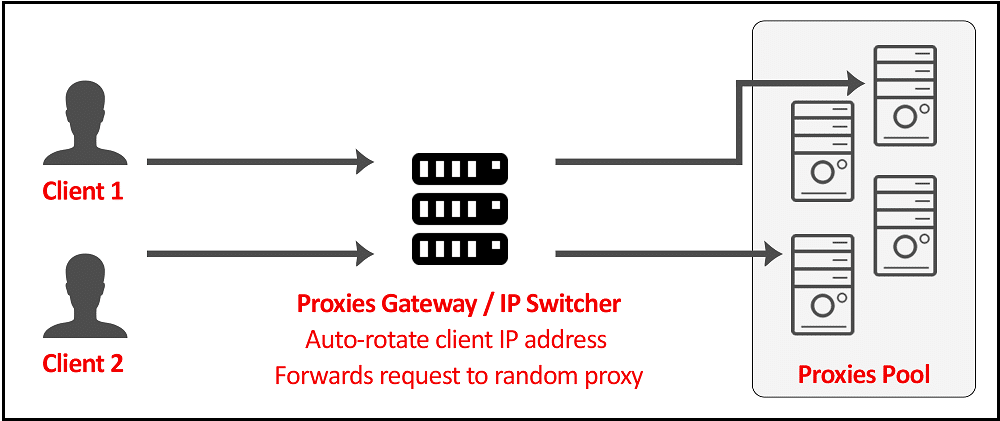
Depending on some factors such as location, and session control system in place, a proxy pool might have more than one entry point. While individual proxies are represented by their IP Address such as,
123.52.14.244:8080
a proxy pool is usually in a domain format such as
thatcoolproxypool.com:8080
This is so because you can’t tell for sure this is the proxy/IP your request will be routed through as the pool system decides that.
One very important aspect of a proxy pool is that it comes equipped with an IP rotation mechanism. If you are making use of a proxy pool and you send 10 web requests, each of these 10 requests will be routed through different IPs even though you’re making use of the same entry point – thanks to the IP rotation system. Depending on the IP rotation system, a proxy pool implements, rotation can be after every session or a specified period of time, or both.
Why Use a Proxy Pool?
If you are just a regular Internet user trying to mask your IP Address but not trying to break any request limit, making use of a proxy pool might be an overkill for you. However, if you are making use of automation tools such as web scrapers, you will find yourself needing many proxies to use in other to exceed action limits and prevent blocks and bans. If you find yourself needing to working with a reasonable number of proxies in a project, it is time to ditch using individual proxies and embrace proxy pools.
This is because, with a proxy pool, you will be dealing with only one entry point as opposed to individual proxies that each has its own entry point. This means that regardless of whether your project requires 10 proxies or 10,000 proxies, you will be dealing with only one proxy entry point while the proxy pool system decides the IPs each of your requests will be routed through.
Proxy pools take over the burden of managing proxies from you. It also takes care of IP rotation. Some proxy pools also clean themselves as they are actively checking for bad IPs in the pool to remove. This makes them better for projects that require a large set of proxies to work successfully.
Types of Proxy Pools
Proxy pools manage a collection of proxies and their associated IP Addresses. The type of proxies in the pool decide the type of the proxy pool. Generally, there are basically 5 types of proxy pools based on the type of proxies it contains. Each of these 5 will be discussed below.
There is little doubt, The Residential Proxy Pool is #1 choice nowadays.
Free Proxy Pool
The Free proxy pool also know as the public IP Pool is a managed list of free proxies. Usually, the IPs are datacenter IPs but in some public IP pools, you can get a mix of residential IPs. When it comes to reliability, you need to know that Public IPs are the most unreliable proxy pools.
This is because public proxies, otherwise known as free proxies are easily detected, blocked by default by some websites, and in some cases, even leaks your real IP Address without you even knowing. They usually do not require any form of authentication before use.
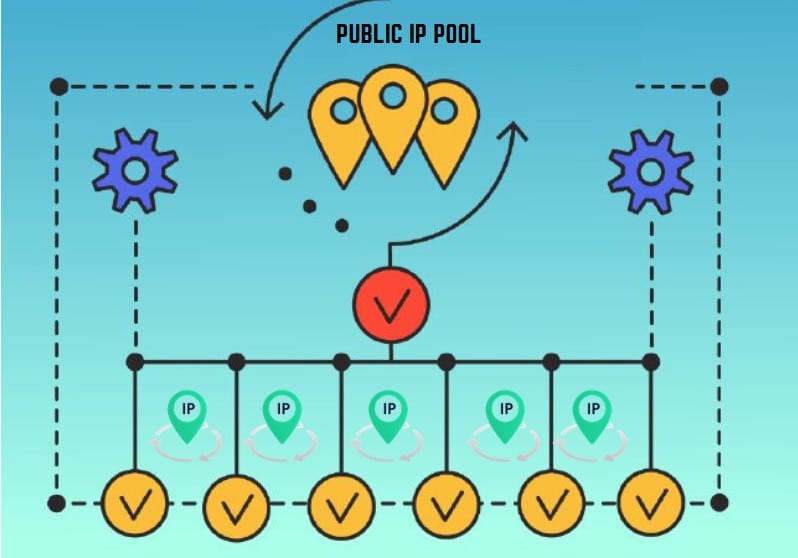
Public IP pool is very easy to build if you want to leverage on the free proxy list sites on the Internet. To create a public IP pool, you need a scraper to scrape free proxies for you on the Internet, a proxy checker to make sure the pool contains only working proxies, and an IP rotation system, among other things. However, you just have to know that using a public IP pool for any reasonable activity online is a bad idea – you’ll suffer from the effects of bad neighborhood, spam, and its unreliable nature.
Datacenter Proxy Pool
A datacenter proxy pool is a proxy pool that comprises of datacenter IPs only. Datacenter IPs are IPs owned and managed by data centers such as Amazon AWS, Vultr, Digital Ocean, Linode… A datacenter proxy pool enjoys all the advantages and suffers from all the disadvantages associated with datacenter proxies. Proxies from datacenter proxy pools suffer from a lot of blocks because they are easily detected.
Many complex websites have been spammed a lot using datacenter proxies, and as such, they are put to extra scrutiny, and considering the fact that they have a uniqueness that’s peculiar them alone, they can be easily detected and blocked.
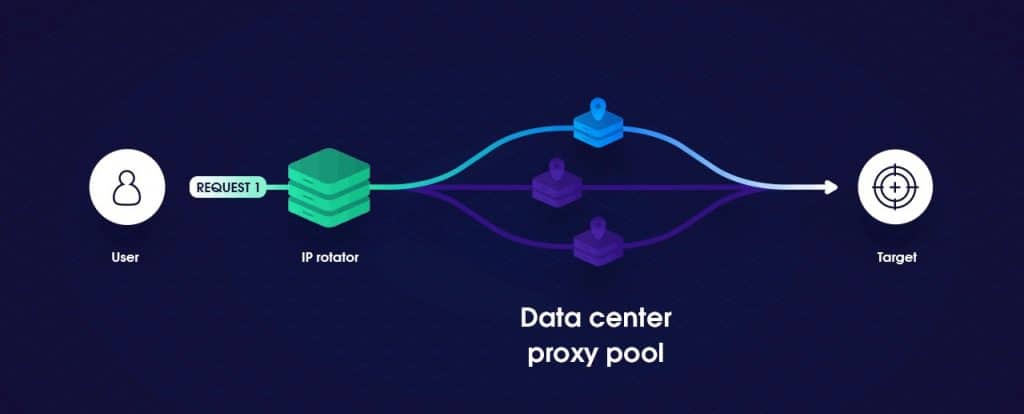
Because they are easily detected and are susceptible to blocks, proxy pools with datacenter proxies are not suitable for use on many complex websites except a few like Twitter that still allows datacenter proxies on their site.
Datacenter proxy pools are a new thing in the industry. Most of the datacenter proxy providers sell individual IPs, which can either be private or shared. However, there are a few proxy providers that have managed proxy pools and allow their users access to them. Some of these providers include Stormproxies and Blazing SEO.
Residential Proxy Pool
Residential proxy pools are the type of proxy pools that contains only residential proxies. Residential proxies make use of IP Addresses that are assigned to devices in residential areas by Internet Service Providers (ISPs).
Unlike in the case of datacenter proxy pools that suffers from blocks, the proxies in residential proxy pools do not have such problems as they route requests through devices of real Internet users, and as such, it becomes difficult for websites to detect them – not to talk of even blocking them. However, they are not blocking proof.
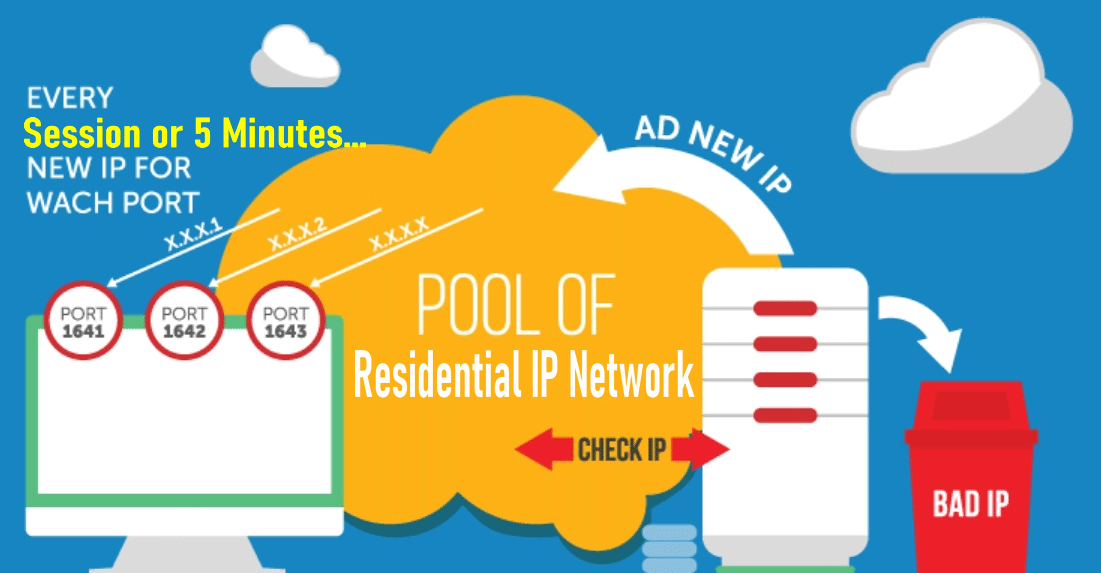
They can also be detected and blocked but not as common as in the case of datacenter proxies. Most residential proxy providers make use of proxy pools. This is because they do not own the IPs they rent out to their customers. They get their IPs through peer-to-peer networks where regular Internet users join for some benefits to allow their Internet bandwidth and IPs to be used when their device is idle. So, they do not have any option but to make use of proxy pools. Only devices available at a particular moment is used. This means that the number of proxies in a residential proxy pool changes a lot.
However, because most of them have proxy pools with IPs in millions in them, this is not a problem. Residential proxy providers allow users to use their whole pool or a part of it, and their pricing is usually based on bandwidth usage. Only a few, such as Stormproxies and Shifter, are priced based on ports. Most of the residential proxy pool owners, such as Luminati, Smartproxy, and GeoSurf, are priced based on consumable bandwidth. Residential proxy pools are more expensive to pay for because of their undetectable and stealth nature.
Mobile Proxy Pool
Mobile proxy pools are the type of proxy pools made of just mobile IPs in it. When it comes to being undetectable and unblockable, mobile proxies take the lead. Mobile IPs are assigned by Mobile Network Operators (MNOs), the ISPs of mobile Internet-enabled devices. Luminati pioneered the idea of mobile proxies, and as it stands now, it still has the largest mobile proxy pool with over 7 million mobile IPs in its pool. Just as it is in the case of residential proxy pools, most owners of mobile proxy pools get them through a peer-to-peer network.
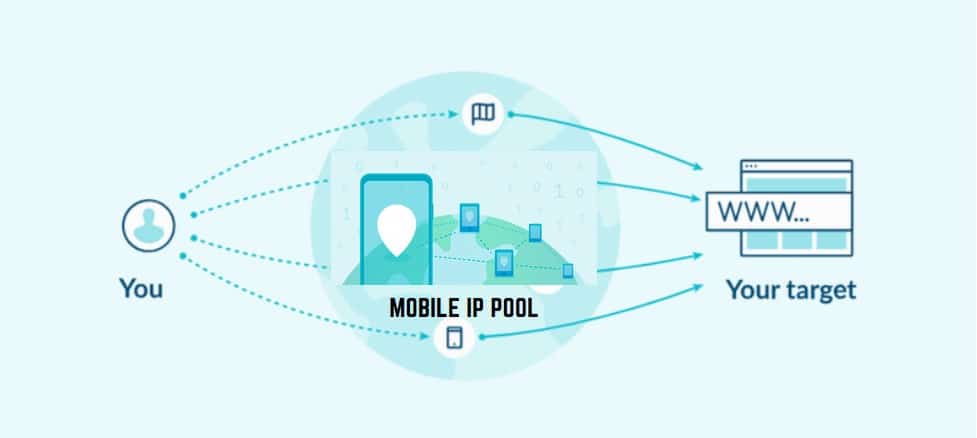
While mobile proxies are some of the most effective proxies when it comes to being compatible with complex websites such as Instagram, we do not advise people to use them unless they have no other option left as they are generally more expensive when compared to residential and datacenter proxies.
Mixed Proxy Pool
A mixed proxy pool contained datacenter, residential and mobile proxies in the list of proxies it manages and route clients’ requests through. This means that the pool comprises of IP Addresses owned by data centers as well as IP Addresses owned and assigned by ISPs.
When you opt to use a mixed proxy pool, just be aware that your requests will reach websites through either of these two. The advantage of using a mixed proxy pool is that it is not as expensive as a residential proxy pool service provider and not as susceptible to blocks as datacenter proxy pools.
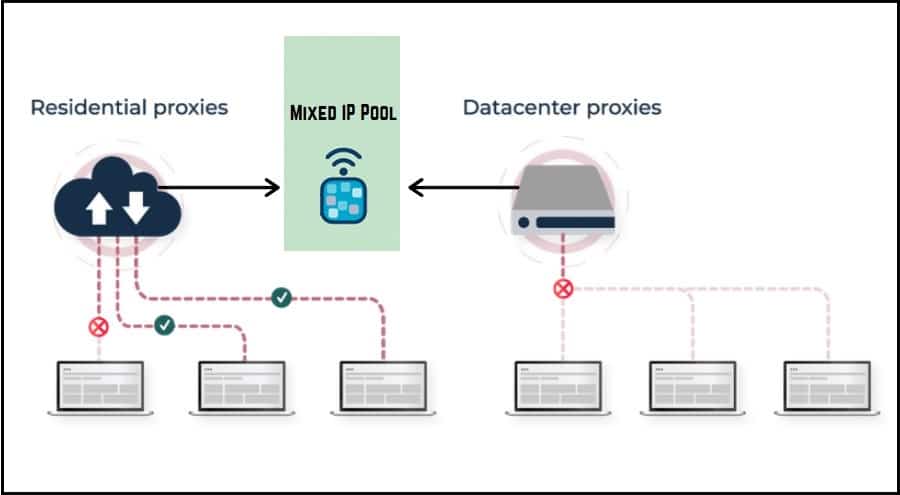
You just have to have it in mind that you’ll be enjoying the good aspects and suffering the bad aspects of the two types of proxy pools. Mixed proxy pools are used mostly for web scraping, and the bulk of mixed proxy pool providers tilt toward web scrapers as the target audience.
There are no many providers that come out plain as mixed proxy providers. Only a few providers, such as Proxycrawl, are opened with the fact that their proxy pool is mixed.
Conclusion
Proxy pools make using proxies easy. Instead of dealing with many IP and port pairs, you got to deal with just an IP and its port, and you will get all the benefits of individual proxies with other benefits such as IP rotation. They are perfect for web scraping and crawling, social media automation, and Ads verification, among other uses.






